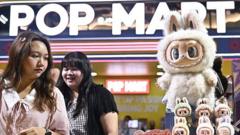Pop Mart, the Beijing-based company that has taken the toy industry by storm with its Labubu dolls, has revealed astonishing growth figures for the first six months of the year. The firm anticipates profits to leap by at least 350% as revenues have skyrocketed, more than tripling since last year. This impressive financial performance is attributed to the brand's burgeoning global identity and effective cost control measures.
The company, valued at more than $40 billion, is heavily reliant on its signature marketing strategy of selling toys in "blind boxes" – packaging that conceals its contents until opened. While this method has garnered criticism for promoting compulsive buying, it has undeniably contributed to the immense popularity of Labubu dolls. These elf-like figures, notable for their distinctive gapped teeth, have created a frenzy among collectors and shoppers alike, leading to long lines in stores across the world.
Since its launch in 2019, Labubu memorabilia has helped Pop Mart evolve into a significant player in the retail market, with a footprint of over 2,000 vending machines and outlets globally. The company made its debut on the Hong Kong Stock Exchange in 2020, and its stock has dramatically surged by nearly 600% in the past 12 months. Notably, revenue from outside mainland China has accounted for almost 40% of total income in 2024.
In June alone, sales of Labubu dolls in the United States rose by an astounding 5,000% compared to the previous year. This growth has been fueled by high-profile endorsements from celebrities like Kim Kardashian and Lisa from the K-pop sensation Blackpink. Furthermore, strategic partnerships with recognized brands such as Coca-Cola and the manga franchise One Piece have elevated the doll's international profile.
While the overwhelming demand has forced retailers to pause sales temporarily, the fantastic resale market for Labubu dolls has flourished. Originally priced around $10, these collectibles have sold for hundreds of dollars, including a jaw-dropping auction price of $150,000 for a life-sized Labubu. However, this surging popularity has also sparked a wave of counterfeits, known as Lafufu dolls, resulting in the seizure of over 46,000 fake Labubu toys by Chinese authorities in a clampdown on the black market.
The company, valued at more than $40 billion, is heavily reliant on its signature marketing strategy of selling toys in "blind boxes" – packaging that conceals its contents until opened. While this method has garnered criticism for promoting compulsive buying, it has undeniably contributed to the immense popularity of Labubu dolls. These elf-like figures, notable for their distinctive gapped teeth, have created a frenzy among collectors and shoppers alike, leading to long lines in stores across the world.
Since its launch in 2019, Labubu memorabilia has helped Pop Mart evolve into a significant player in the retail market, with a footprint of over 2,000 vending machines and outlets globally. The company made its debut on the Hong Kong Stock Exchange in 2020, and its stock has dramatically surged by nearly 600% in the past 12 months. Notably, revenue from outside mainland China has accounted for almost 40% of total income in 2024.
In June alone, sales of Labubu dolls in the United States rose by an astounding 5,000% compared to the previous year. This growth has been fueled by high-profile endorsements from celebrities like Kim Kardashian and Lisa from the K-pop sensation Blackpink. Furthermore, strategic partnerships with recognized brands such as Coca-Cola and the manga franchise One Piece have elevated the doll's international profile.
While the overwhelming demand has forced retailers to pause sales temporarily, the fantastic resale market for Labubu dolls has flourished. Originally priced around $10, these collectibles have sold for hundreds of dollars, including a jaw-dropping auction price of $150,000 for a life-sized Labubu. However, this surging popularity has also sparked a wave of counterfeits, known as Lafufu dolls, resulting in the seizure of over 46,000 fake Labubu toys by Chinese authorities in a clampdown on the black market.






















